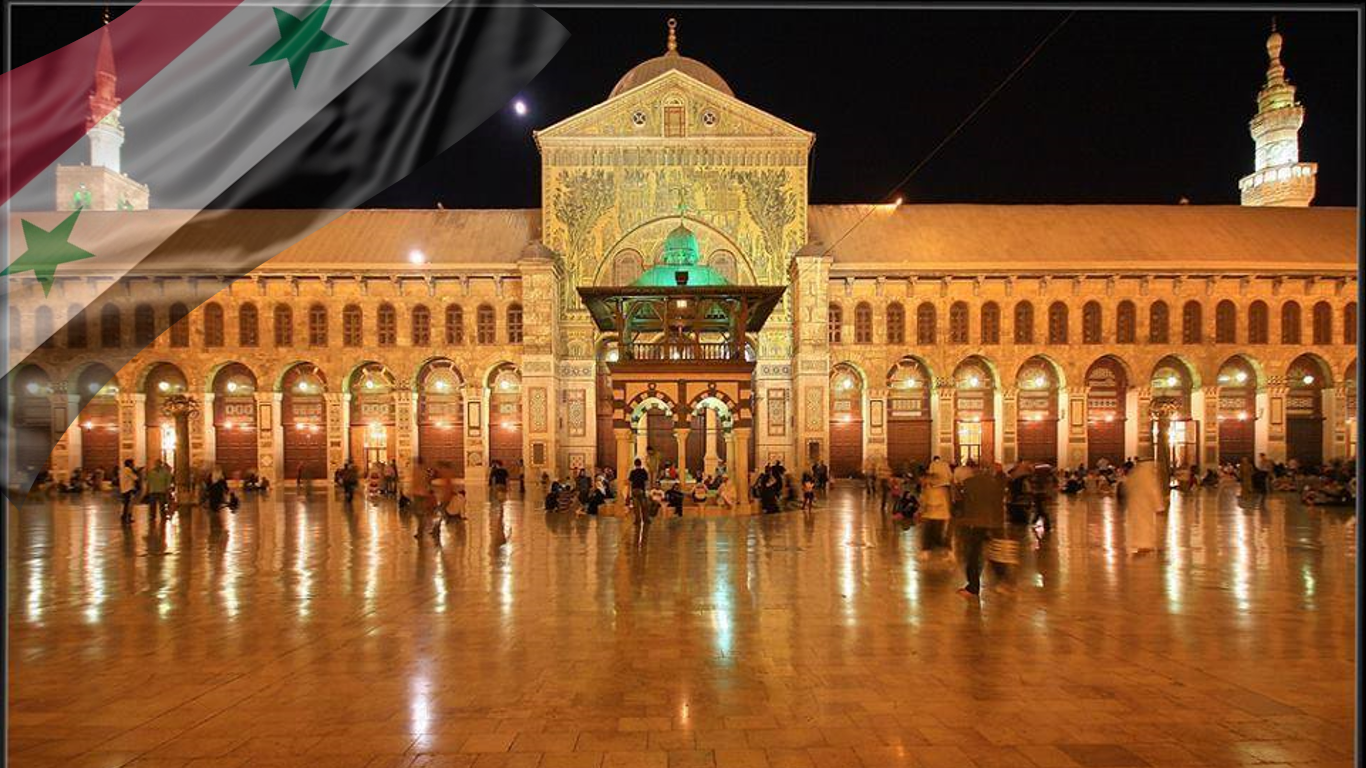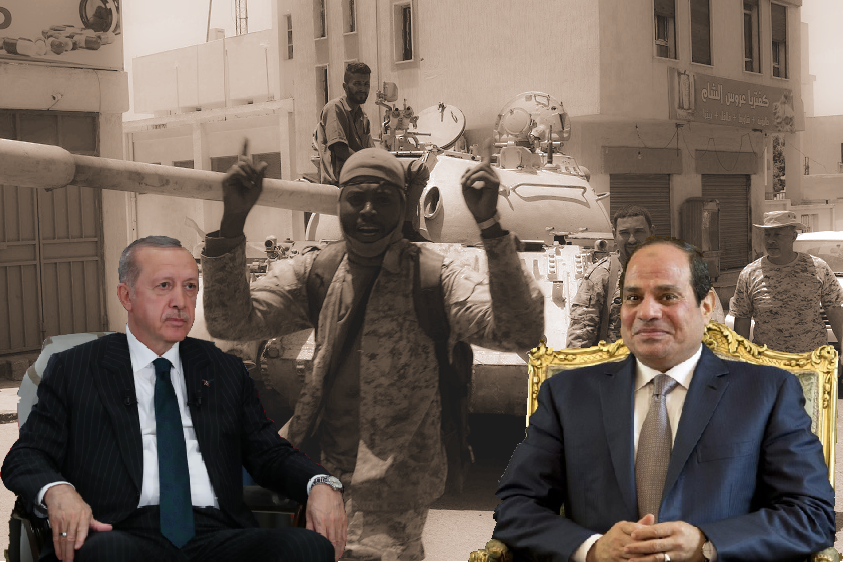During the last two weeks since we dealt with the Libyan crisis, the situation did not calm at all. To the contrary, both the Turkish and the Egyptian side tried hard to show the power and intimidate the other. If we consider these steps as bluffs, it is clear the other side is not folding. All point to very serious war plans and the possibility of open war, at least within the limits of Libya, but might even beyond that, is growing by the day.
However, there are other events all over North Africa. These show that the two major war-camps tearing the region apart, the Turkish-Qatari and the Egyptian-Saudi-Emirati ones about which we wrote so many times and which face each other in a number of frontlines from Sudan to Yemen and Syria, all the way to Libya opened new chapters to gain the upper hand in Libya. These now reach from Tunisia to Azerbaijan and Armenia, and naturally, the readings to them many, just as their possible intentions. Such attempts might mean that the rival camps are still probing each other and trying to improve their own chances, but if such moves lose steam without a decisive change it can mean that they run out of options. And then war becomes almost unavoidable. The recent steps by President as-Sīsī and the military drills both by the Turks and the Egyptians certainly suggest this trajectory.
There are, however, many seemingly hidden hands on the ground, suggesting that there are conflicting agendas far beyond the implications of the Libyan theatre.
Are we really closing on to war in Libya? Will Egypt really move in after the “Libyan people” asked for “intervention and the liberation of Libya”? If so, how will Turkey react? Does Erdoğan really have some aces still hidden in his sleeves, which can turn the table around? Will the regional states and the EU sit idly by watching this development, which by the growing Turkish aggression becomes more and more alarming? These details shall be our topic this week.
Escalation
Since where we left off last time some unknown planes have bombed the al-Waṭiyya airbase run by the Turkish forces, only hours after it was put into operations and inspected by Turkish Minister of Defense Hulusi Akar. A clear message that the hit could have included the Minister. The base was reportedly destroyed completely. After the fiasco of the Russian air defense systems in the clashes in May, this was a strong message that the Turkish Hawk air defense system and the Coral jamming protection system can be eliminated easily as well. Revenge on the technical scale.
In response amidst the threats and political debate, Turkey held a major military drill on 8 July along the Libyan coast. A clear message that Ankara is not willing to back down and will protect the al-Wifāq government against Egypt. A day later Egypt held a major land-sea-air drill along the Libyan border under the title “decisiveness 2020”, with specific training for major amphibious maneuvers, as this is the most likely method of the Egyptian intervention. Not surprisingly, none of the sides were impressed or intimidated.
On 13 July Turkish Foreign Minister Mevlüt Çavuşoğlu announced that a ceasefire is only possible if the Ḥaftar withdraws beyond Sirt and al-Ğufra, the very cities as-Sīsī marked as “red line” for Egypt. By the view of Çavuşoğlu peace negotiations can only start after these are taken over by the al-Wifāq forces, and announced that if that does not happen Turkey might intervene directly to achieve that. Meaning that Turkey intentionally raised that stakes that it is willing to intervene in Libyan even without Egyptian intervention. Giving the clear signal that an Egyptian step will not go unpunished.
It was Egypt’s turn and the answer came very swiftly. On 14 July the Libyan House of Representatives officially asked Egypt to intervene military and “liberate Libya from the Turkish occupation”. Thus granting the legal basis for the military strike, which was put as a precondition in Sīdī Barrānī. Now that condition set there was a legal basis, at least some sort, for as-Sīsī to move in. He already acquired Arab support by the Arab League and direct support from Saudi Arabia. But Cairo wanted to put a more convincing spectacle. On 16 July grand meeting was organized between as-Sīsī and the representatives of the Libyan tribes under the name and motto: “Egypt and Libya. One people… One faith”. There should be little doubt that the event was well-groomed and thought some representative claimed that they “represent all the tribes of Libya, expect few in the West”, it is more of a facade to show that besides the “legal authorization” Egypt has “popular support” by the real Libyan people.
Several key notions, however, were important. First of all, this is the first time as-Sīsī specifically mentioned that they “will” go into Libya and they would fight against foreign militants. So not the Turks, but also not Libyans, as Ankara accused Cairo. And as-Sīsī also said for the first time that Egyptian troops “will leave by your order”. Signaling that Egypt prepares for a long engagement and has an exit strategy. However, he also mentioned that the intervention has to be legal, and for that, he needs approval from the Egyptian Parliament. Given the state of the Egyptian political system, there can be little doubt that the Parliament would rubber-stamp anything the president puts forward, still, the notion is important. This might be a signal that there is still time and Cairo is still not committed to action. Either way, the threat now is very real.
Not surprisingly a day later came the response. The al-Wifāq government via its spokesman Hālid al-Mišrī refuted the threats as nothing and that the tribes represent no one. That much was expected, but Erdoğan’s response was more significant. Beyond the usual claims that Egypt’s steps are not legal, while Turkey’s presence is built on the agreement with the legal government, he suggested that Ankara will make a new agreement with the al-Wifāq under international supervision. Also this time he specifically lashed out against the Emirates. That latter is a clear response to the attack on the al-Waṭiyya airbase, but the idea of a new deal is important. Regardless of the aggressive tone that is a major step back for two reasons. So far Ankara was only using power, so it is curious what benefit a new deal would bring. He needs international recognition for his recent gains. And it is very unlikely he will get it, given the very wide range of opposition. Ankara might claim, and there is truth in it that far not everyone opposes its presence, but in fact, there is no one, who supports or even accepts it. The other key thing in this is what happens if there will be no such new deal with international recognition? Here again, we might see a minor sign of backing up.
Despite the very aggressive rhetoric and mutual tricks of intimidation, by the end of the week, there are very subtle signs that there is still way back. During the week the Turks also claimed that in Moscow there are direct negotiations between Turkish and Egyptian army officers, which Egypt denied, but it still means that there might be hope. Overall, however, the threat is very real, and the two states, the two camps are sliding into war faster than they can control it at this point.
Is Tunisia the first victim?
We suggested almost a month ago that Tunisia heavily suffers from the Libyan crisis. Not only as a security and foreign policy concern but has very serious internal political implications. The country is grounding between the an-Nahḍa, the local branch of the Muslim Brotherhood and a close ally of Turkey, the Qalb Tūnis (Hearth of Tunisia) partly of a Western affiliate tycoon, Nabīl al-Qaruwī, and the smaller parties with most of the state institutions converting around President Qays Sa‘īd. The president so far desperately tried to stay out of party politics – being a non-partisan – himself, but the current situation and his repeated clashes with Speaker of the Parliament and leader of the an-Nahḍa Rāšid al-Ġannūšī undermined this position. It was recently revealed that there might be Emirati-Saudi plans to stage a coup in Tunisian based on the Egyptian model, either with this president involved or against him, with the aim to block the Turkish buildup and possibly open a new front against this Libyan presence. Also, the recent American buildup in Tunisia specifically against Russian activities is alarming. All these signs show that Tunisia will be dragged into the conflict against its will and intention to prevent a war in Libya.
Tunis first tried to rally Algerian support, but for reasons still contradicting Algeria is still not willing to take sides. The second attempt was to utilize French backing, but after harsh rhetoric, Paris seems to distance itself from the Libyan matter or to rely on a joint EU mediation. Either way, it is clear that France on its own will not take military action against the Turkish presence in Libya, no matter will Egypt intervenes, or not. And this stalemate has already had a corrosive affect on Tunisian politics. Until the first bombshell fell.
It was on 12 July that a number of parties lead by ‘Abīr Mūsā’s Free Dustūr Party [al-Ḥizb ad-Dustūrī al-Ḥurr], who was specifically mentioned in the news as one of the main protagonists in the Emirati coup accepted a motion to launch a vote of no-confidence against Rāšid al-Ġannūšī. While that procedure needs only a quarter of the MPs, sacking al-Ġannūšī would need a majority in the 217 member Parliament. It was a curious step, as given the highly fractured political landscape in the Parliament it was very doubtful if indeed this majority can be obtained, even though the an-Nahḍa does not have a majority. However, and that is the dangerous part of it, the an-Nahḍa immediately retaliated and suggested an alternative has to be found for Prime Minister Ilyās al-Fahfāh. Soon enough they revoked their support for the government and the PM, and all the an-Nahḍa ministers, who are in fact few in a largely non-partisan government, stepped down. That lead to a stalemate and virtual power struggle between al-Ġannūšī and President Sa‘īd. The first vote of no-confidence on 16 July managed to gain only 73 PMs, but that is not the end of it. Another 16 is announced that they are ready to support the motion given PM al-Fahfāh and the government is sacked as well.
In a result the Tunisian government failed and likely the same painstaking process will start once again, which went on for months after the elections last year. Which at the produced a non-partisan government, because no majority coalition could be formed. If this starts once again and the an-Nahḍa keeps blocking new PMs the president will have to consider sap elections. That will take a huge amount of time once again. In the meantime, Tunisia will suffer economically and politically, but the an-Nahḍa wins time and can hope that the regional equation until than shifts for its benefit. But even so, it is unlikely that the an-Nahḍa could win the next elections. The party, though still the strongest, steadily loses support since 2014.
It was clear that a desperate attempt was made to discredit al-Ġannūšī and his party and cause internal trouble, not to let an-Nahḍa give any support to Turkey. The an-Nahḍa used its influence to block this attempt, but the result is that now Tunisia is slowly sliding into chaos. And as long as it is so paralyzed it cannot take efforts to influence the Libyan events. It is clear that regionally rivaling major camps clashed in Tunisia, but Tunis might not be the last victim to suffer this faith.
On other fronts
Recently the Turkish activity manifested in a number of fronts, and it would be a mistake to see these unrelated. On 12 July border skirmishes started between Armenia and Azerbaijan, resulting in the death of 11 Azeri and 4 Armenian soldiers. Azeri President Aliyev already sacked his Foreign Minister for conducting “useless negotiations” with Armenia to prevent escalation. The conflict in itself is nothing new as the two countries fought several wars against each other since their independence in 1991, and as there are still pending border disputes. Such clashes are not surprising. However, since the beginning, the conflict had a regional dimension as well. All three Caucasian states have their “big brother supporting them. Georgia is supported by the US, Armenia by Russia, and Azerbaijan by brotherly Turkey.
The scale would have shifted since 1991 to the favor of Azerbaijan, being vastly superior in funds and population, but so far Armenia always managed to overcome its foe, mainly for the constant Russian support. It is very hard to see the event not connected to the struggle between Turkey and Russia in Libya and Syria. In Syria, negotiations are still ongoing to prevent another offensive by the Syrian army against the Turkish backed terrorist factions in Idlib, and the Syrian side is growing ever more impatient. It is interesting that during such meeting Iran was always balanced and conciliatory, but recently, especially after the recently signed military and security cooperation protocol Iran started to use a harsher tone and demand Turkish withdrawal. Thus signaling that Turkey is, though very slowly, but losing its position in Idlib. More so, because it cannot control these elements and the infighting during the last weeks increased between the terrorist factions. In Libya, Turkey took the positions that it is practically dealing with Russia, and Russia alone, disregarding the Egyptian threats. Thus elevating its own status and projecting confidence. So far Moscow was ready to listen, but the support for Ḥaftar and his forces are growing. There are rumors that Russia’s infamous Wagner Group is withdrawing from Libya, but by all probability in June after the defeats of Ḥaftar Russia took over the airbase in al-Ğufra via Wagner. Therefore the specific demands from Turkey for al-Ğufra and Sirt not only mean a desire for the oil facilities but also to dislodge Russia from here.
In this context with such complex relations between Moscow and Ankara, opposing each other in Syria and Libya and on big stakes, while working together on oil pipelines to Europe via the Balkan, it is very probable that Turkey heated up the old Azeri-Armenian conflict to gain an advantage in the main disputes. It is very noticeable that knowing the unshakable Russian support behind Armenia Erdoğan is not easing the tension like now Iran does, but fuels it promising support. Which in light of Libya now, has a special charm.
On 11 July Turkish Supreme Court overthrew the government’s decision in 1934 and reverted the Aya Sofia in Istanbul from the museum to the mosque. This of course serves a political agenda, as naturally there are plenty of places for prayer in Istanbul, but the Aya Sofia has a special message. A message of spiritual and political leadership to the Muslim world, and the message of reawakened Turkish ambitions and prowess for Europe. And the example is already spreading, as the ruler of aš-Šāriqa Emirate in the UAE suggested that upon the example of the Aya Sofia the Mosque of Córdoba in Spain should also be returned. It is clear Turkey now flexes all its muscles and understandably. If this gamble works, after a century Turkey indeed returns to a former colony, withstands European pressure, and would have leverage on the EU, controlling both major migration transit routes. With such victory in maritime disputes in the Mediterranean Ankara will be unstoppable, and with the economic and moral boost elections are secured for another decade. And it should be kept in mind that Erdoğan all leading positions counted has already lead Turkey as long Atatürk.
And these are not the only fields, where the Turkish-Qatari axis has gained ground recently. On 14 July the International Court of Justice ruled in favor of Qatar in the dispute of areal blockade. Since the Gulf crisis in 2017 June Egypt, Saudi Arabia, Bahrain, and the Emirates with winning some, mostly African states for support imposed a complete blockade over Qatar, accusing it of support for terrorism, the intervention of internal affairs in other countries, and having way too close relations with Iran. This struggle has many implications and goes on for long. At the time of the crisis, a Saudi-Egyptian military intervention was only prevented by the presence of Turkish and Pakistani troops in Qatar. Nonetheless, it was viewed by the blockading party that an economic blockade will force Qatar to its knees soon enough, but Iran opened its air and port, and the Turkish support poured in. Thought the original idea was that with the Qatari monetary support deprived Turkey, or at least the Erdoğan government can be broken. This clearly failed and the Turkish-Qatari axis only grew stronger. Now, however, the supreme international court of the U.N. ruled in favor of Qatar, therefore Riyadh and Abū Zabī not only lost this battle but likely to be forced to pay reparations. And that comes at the same time when it was revealed that recently in June Washington was pushing for a settlement between the GCC members, a deal with Doha, which the Emirates could only block at the last second.
This is yet another signal that the Saudi-Emirati block loses its regional struggle with the Turkish-Qatari camp. That is why it chose to bomb the al-Waṭiyya airfield and pushing Cairo for action. And that is why Ankara is openly sending its messages not only to Egypt but also to the Emirates.
Hidden hands
During all these deliberations one question stayed practically unasked, which in the Middle Eastern context is more than strange. Where is Israel in this? Tel Aviv is remarkably silent in the Libyan matter, which is more than puzzling. Not only for Israel’s know activity, with which it follows all the major currents of its region – a key factor in its success -, but because the military activity of a powerful neighbor, Egypt, is impossible to be a secondary issue for it, while the Turkish activity with the relocation of the terrorist groups from Syria to Libya does greatly affect the Syrian scene, which is a proclaimed priority for the Israeli leadership. One possible and very convincing argument is that Israel is heavily hit by the Corona crisis, possibly even more than most of its neighbors, and by the current internal political clashes around Netanyahu, and whatever energy remains is dedicated to the Western relations and the Syrian front, waging a hidden war with Iran there.
However, two pieces of minor information suggest that Israel, or some agent very close to it, might not be just that passive in the Libyan case. We suggested that one of the major obstacles for Egypt to dedicate itself to a major engagement in Libya was the matter of the Grand Renaissance Dam in Ethiopia. During the last few weeks, as we pointed out the last time Egypt managed to improve its position considerably and Ethiopia is about to lose this struggle, at least not winning so decisively as it wished. There are accusations since then that Ethiopia is in fact filling the dam secretly. The Ethiopians strongly deny such suggestions, but the change in tone is very obvious. It is not Addis Ababa, which dictates terms and threatens to walk out from the negotiations and finish the project by its own liking, but Cairo is on the offensive and the Ethiopians are trying to defend their position. But where is Israel involved in this?
For decades now Israel is harboring very close ties to East African states as a sort of back, or secondary frontier against its Arab neighbors, but also as a fertile field for its investments. And Netanyahu was particularly active in this matter. The recent developments with Sudan support this trajectory and might even explain to a certain limit why Khartoum is so quiet in this water dispute. Within this policy, Israel strongly supports the building of the Renaissance Dam in Ethiopia, and suggestions already in October 2019 went as far as to claim Israel would specifically give military protection to it. Though officially Israel denied this latter suggestion, it is easy to see that it is heavily involved in the dispute and the matter is a useful bargaining chip against Cairo. Now winning both in the Ethiopian and the Libyan matters would increase Egyptian ambitions and sphere of influence. Though there are no clear official statements about it, its is very unlikely that Israel would like to see Egypt advancing so much, much rather a prolonged engagement would be preferable. Either by keeping the Libyan crisis open as long as possible, or make sure that once Egypt moves in it wouldn’t be able to pull out any time soon.
And here comes the other strange incident. On 16 July 2020 the Algerian weekly Echorouk (aš-Šurūq) citing the French Le Point brought it on from page that the famous activist, philosopher, and filmmaker – among many murky titles – Bernard-Heri Lévy is in Libya on a very dark mission.
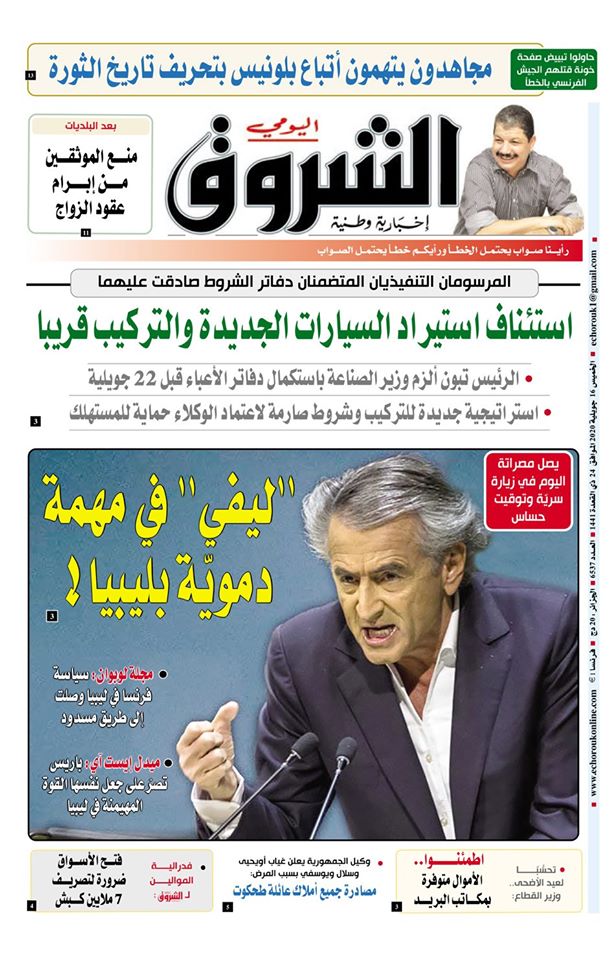
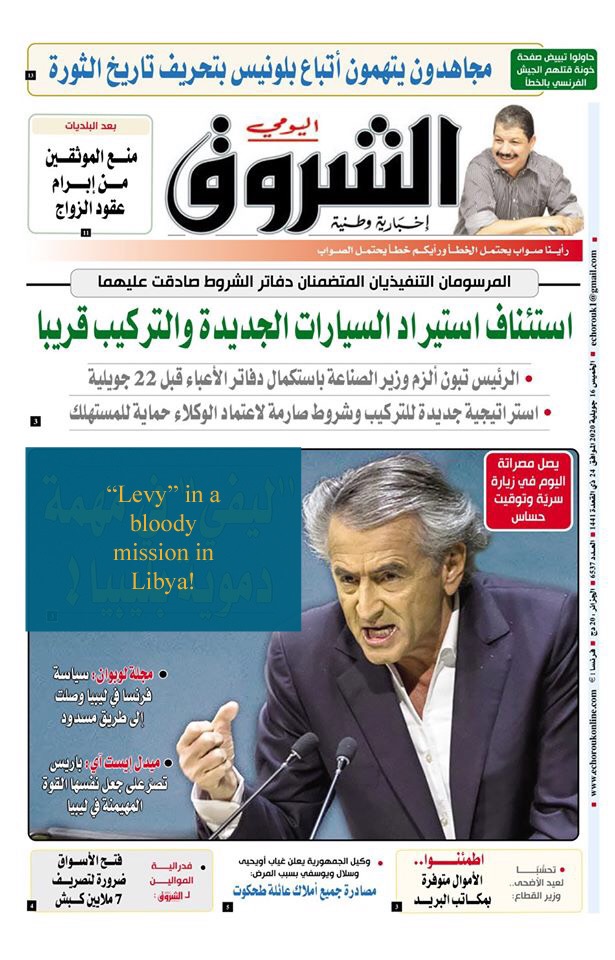
Lévy, a French by citizenship and a very powerful political figure with excellent connections is not only a devoted Zionist and supporter of Israel, but has a very dark role in bloody events in the Arab world in the last decades. Two specific field in which he was and still is very active are Libya and the Kurdish case. He is very active in Iraq promoting the Kurdish autonomy, being a close associate of former local president Mas‘ūd Barazānī, but at the same time he appeared many times along the Kurdish militias active in Syria. Here his protege is the infamous Mazlūm Kobane, commander of the Qasad (Syrian Democratic Forces) terrorist group, who is the most known faces of this faction in the Western press.
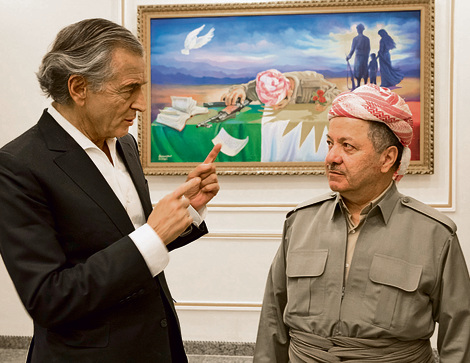

Lévy is specifically active in several fields from direct Western military support to political promotion for the Kurds, which many see as a subtly hidden Israeli agenda to weaken the Arab states around itself.

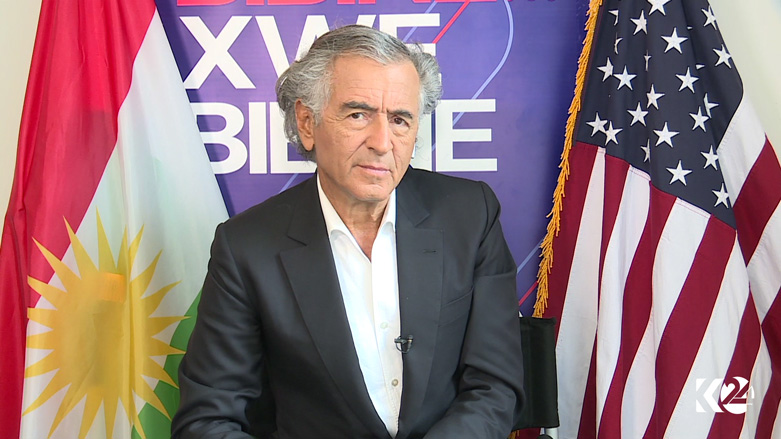
His role, however, in the whole “Arab Spring” and specifically Libya is of a more direct nature, as famously in 2011 Lévy was cruising Libya with a small military detachment directly many of the small on-the-ground details, many still not detailed to this day. He wasn’t even shy about his role as in several interviews he recounted these adventures.
His recurrence in Libya now, especially in Miṣrāta, one of the key positions of the Turkish buildup poses many questions, as Lévy seldom visits such places without a very specific agenda. Little is known about his current mission and the aš-Šurūq article couldn’t provide many details either, but his presence confirms that the struggle at this stage is way beyond a simply showdown between Turkey and Egypt.
A changing region?
Surely an all-out war is the last thing the region, and especially Europe wants, with all the possible implications of growing militancy, new waves of refugees, which is only worse with the Corona epidemic, and uncertain result. But as Turkey sees its growing power and flexes its muscles in many frontiers, it might be too hard to stop and the events slide into war. Just the same way, Egypt cannot really afford a war. Especially not a prolonged one. But allowing a foreign power settling in its backyard, especially Turkey, with which the current leadership had a hysteric quarrel ever since it took power is even less acceptable. And if there are not alternatives war might be inevitable. The recent steps by both sides certainly show that neither of them are willing to back down. But if none of them does war is the only possible result. And we are closing on that with each passing day.
Would such war erupt, especially if it spills out to be a regional one between Turkish and Egyptian forces not confined to the Libyan frontiers and of their respective allies join in, the implications are unmeasurable. However, the results would reshape the landscape in North Africa for the EU and for the US as well, and than they would have to deal with fundamentally different realities. Either this means a Turkey wresting control over Libya, or a significantly weaken and broken, consequently more desperate one.
These are very important deliberations indeed are ruled the news in the Middle East. So much so that it almost completely overshadowed another development, the results and suggestions of two agreement recently Iran made. One with Syria on a more direct military and economic cooperation, and one with China. And the latter, which understandably took the attention of the Western press, focuses on economic cooperation, which has implications so far reaching, might even change the realities in the Eastern part of Middle East. That deal, especially in the light of the Libyan crisis, might prove to be a game changer.
This, however, will be our topic for next week. Until than, even more will be revealed.

